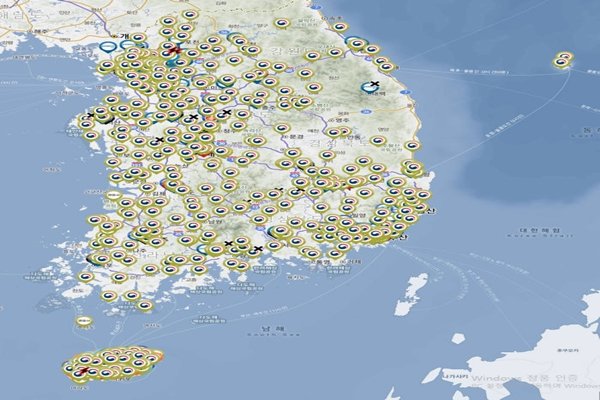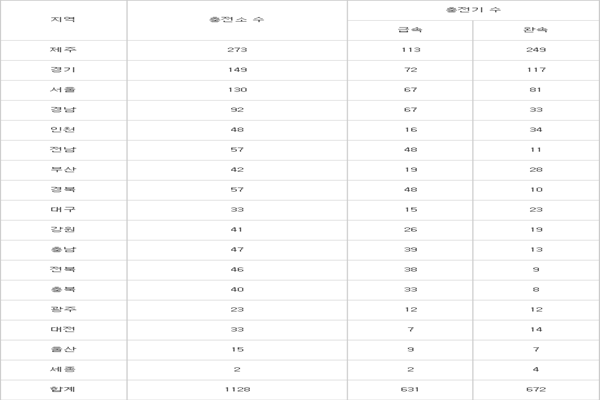Number of public charging stations for electric vehicles in South Korea has surpassed 1,100, and there are 1,303 public chargers. Increase in number of chargers has helped to fade away perception of lack of chargers between people who own electric vehicles.
According to EVWHERE, which is a comprehensive information service for charging stations for electric vehicles, on the 21st, there are currently 1,128 charging stations in South Korea. There are 672 and 631 slow and rapid chargers respectively at these charging stations.
Based on 8,000 electric vehicles that are in South Korea, 12 electric vehicles share a rapid charger. Because South Korea supports slow chargers (7kWh) for households at no cost unlike the U.S. and Europe, number of charging stations is lower than these countries.
Jeju Island has the most charging stations at 273 and there are 113 and 249 rapid and slow chargers respectively. Followed by Jeju Island, Gyeonggi-do, Seoul, and Gyeongnam have 149 charging stations (72 and 117 rapid and slow chargers respectively), 130 charging stations (67 and 81 rapid and slow chargers respectively), and 92 charging stations (67 and 33 rapid and slow chargers respectively) respectively. On the other hand, Chungbuk has the lowest number of charging stations at 40 (33 and 8 rapid and slow chargers respectively) out of self-governing provinces and Ulsan has the lowest number of charging stations at 15 (9 and 7 rapid and slow chargers respectively) out of metropolitan cities.

Out of charging station providers, Korea Environment Corporation has the most charging stations established at 463 (all rapid chargers) followed by POSCO ICT at 144 (3 and 141 rapid and slow chargers respectively), Hyundai Motor Company at 60 (36 and 24 rapid and slow chargers respectively), and BMW at 58 (all slow chargers). Out of private companies, Hyundai Motor Company has the most rapid chargers.
It is estimated that number of charging stations with rapid chargers will surpass 1,500 in 2017. Ministry of Environment (ME) and Korea Electric Power Corporation (KEPCO) will install 430 and 350 rapid chargers respectively by first half of 2017. POSCO ICT and KECVS (Korea Electric Vehicle Charging Service) are also planning to install more than 100 chargers.
“As South Korean Government and private companies are planning to increase number of charging infrastructures, perception of lack of charging infrastructures between people who own electric vehicles is starting to fade away.” said a representative for an electric vehicle industry. “If some manufacturers share their charging infrastructures to everyone even until next year, number of use of public facilities will be a lot more.”
On the other hand, ME announced early this year that there are 750 and 860 slow and rapid chargers are established in South Korea and some of them are still under construction or being registered.
Staff Reporter Park, Taejun | gaius@etnews.com
